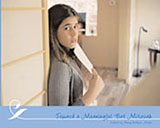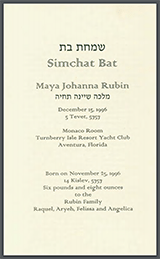
Jewish Orthodox Feminist Alliance (JOFA), 2001: JOFA in Progress Conference, New York City
Targum Shlishi was a sponsor of the conference, “2001: JOFA in Progress,” a dynamic event designed as an informal way in which to discuss ideas and issues of concern to Orthodox feminists. The conference, which attracted approximately 400 attendees, broke new ground because it addressed many issues that were previously ignored or overlooked, such as child abuse in communal organizations, the challenges of motherhood for Orthodox feminists, sexuality, body image, raising feminist children, and the use of the term “Orthodox.”
“The event allowed people to share their ideas and thoughts about these issues and others, and to generate ideas about how to address the issues in the future,” said Andrea Levin, associate director of JOFA. “The conference was exciting for both organizers and participants because of its energy and vitality.”
Targum Shlishi’s funding helped make the conference affordable for a wide range of participants who otherwise may not have been able to attend, including students and young professionals. This assistance was crucial, because young women are the future leaders of the gender-equality movement and of Judaism, and this conference was an opportunity for their voices to be heard.

One Voice: Jewish Women for Israel, JOFA, New York City
Newly created in 2002, One Voice is a coalition of American Jewish women’s organizations united in support of Israel. The organizations represent a broad spectrum of Jewish political and religious views, all of which support a strong US-Israel relationship and are committed to fighting terrorism, anti-Semitism, bigotry, and racism.
Projects to date have included the inaugural event, a national call-in day to Congress in support of Israel in June 2002 called “Take Five: Call Congress for Israel,” and a follow-up call-in to the President in September 2002. Targum Shlishi’s funding was used to help publicize the inaugural event: advertisements were placed in 16 Jewish-American newspapers.

Toward a Meaningful Bat Mitzvah, book project
“ I don’t think there’s anything like this out there. I don’t think anyone else in an Orthodox context has ever broached this subject in a comprehensive way; it’s pretty controversial,” said Nancy Wolfson-Moche, editor of Toward a Meaningful Bat Mitzvah.
The book is a resource for traditional families who are exploring ways in which their daughters can play more active roles in their bat mitzvahs. Toward a Meaningful Bat Mitzvah, which includes a very intimate look at one bat mitzvah and a comprehensive list of references, arose out of personal experience—the bat mitzvah of Felissa Rubin, the Rubin’s oldest daughter. When it came time for Felissa’s bat mitzvah, the Rubins faced a dilemma. They wanted Felissa to have an active role in her bat mitzvah, one that would include her reading the Torah portion. However, the family’s shul, run by a Chabad rabbi, does not allow women to read from the Torah.
The family members devised an innovative solution; they held their own service in a makeshift synagogue early Shabbat morning before going to the shul in time for the Torah reading and Musaf service, where Felissa was called to the bimah to give a d’var Torah. At the private service, there was an emphasis on the participation of all women. The men sat behind the mechitzah, while the bat mitzvah led the service and read the Torah, and the women the aliyot. One of the guests, and the first person called for an aliyah, described the experience as magical, “I felt closer to the Torah, closer to God, and spiritually uplifted. I felt my soul, and I found that happening throughout the service—not just when I went up for my aliyah,” she said.
Toward a Meaningful Bat Mitzvah begins with a description of Felissa’s bat mitzvah and includes the reactions of many of the guests, which ranged from positive to questioning to negative. And, of course, Felissa herself had some things to say about the experience: “When I was practicing with the Torah, it was so heavy I practically dropped it. I was worried that I might drop it on the day of my bat mitzvah. But on that day, the Torah felt as light as a stuffed animal!”

Community Awareness, magazine subscriptions
Community awareness is an essential precursor to any lasting, significant change. Women’s roles are in flux in US society and within all denominations of Judaism. Because this is a critical time of great change, it is of paramount importance that Jewish women and the greater community be as aware of and as educated as possible about women’s issues.
In an effort to promote this type of general community awareness, Targum Shlishi gifted more than 100 Jewish women in South Florida with annual subscriptions to each of three Jewish women’s publications. The publications were Lilith Magazine, a Jewish women’s quarterly; Re://collections, the newsletter of the Jewish Women’s Archive; and JOFA Journal, the newsletter of the Jewish Orthodox Feminist Alliance. Many of the people who received the publications would not otherwise have been exposed to them, but they took the time to read and reflect on the materials.
An article in the summer 2000 issue of JOFA Journal, which all of the women received, describes the importance of continuing the think hard about the role of women in the Jewish community. In the article, Blu Greenberg, co-founder and president of the Jewish Orthodox Feminist Alliance, wrote, “Clearly, we are in a transitional state. At the Union of Orthodox Jewish Congregations Rabbinic Awards dinner last March, most of the 13 honorees mentioned women’s issues as critical to their congregational work. While women’s learning is no longer an ‘issue’—with learned and learning women now accepted as a treasured community asset—women’s roles in the synagogue remain a source of confusion, exhilaration, or frustration—all signs of a community in flux. There is a great deal of sorting out to do…”

JOFA, Third International Conference on Feminism and Orthodoxy, Columbia University, New York City
This conference, which attracted a crowd of almost 500 people, had as its overarching theme the question from Genesis: “Where have you come from, and where are you going?”
The two-day conference included lectures, workshops, study sessions, films, programming for high school students, and an authors’ roundtable. Some of the topics were: “Invisible No More: New Roles,” “Spirituality: Ritual and Prayer,” “Breaking the Silence: Family Issues,” and “Wrestling With the Text: Halakhic Issues.” Targum Shlishi provided general support for the conference.

JOFA, Fourth International Conference on Feminism and Orthodoxy,
New York City
Targum Shlishi’s funding helped support JOFA’s 2002 conference, “Discovering/ Uncovering/Recovering Women in Judaism.” The three-day conference of workshops, exhibitions, lectures, performances, and other activities included in-depth consideration of topics such as gender and Jewish education, prayer, and women in public life.

Harvard Hillel, Jewish Superwomen: Living in Two Realms Conference,
Harvard University, Cambridge
What is a Jewish Superwoman? This national collegiate Jewish women’s conference, hosted by the Harvard Hillel, addressed that question. The conference, which took place over the course of a weekend, focused on modern Jewish women’s balance between living Jewish and secular lives.
Speakers and discussion leaders presented 18 workshops and several lectures exploring a wide range of thought-provoking topics. “Personally, the speakers hit the heart of my troubles,” said Rebecca Rakow, co-chair of the conference and a 2001 Harvard graduate. “They showed me and others that religious and secular life do not have to be in conflict with one another if one really wants them both to be part of one’s life.”
Workshops included “Weaving Together Torah and Psychology,” an examination of how Torah can teach us about ourselves, our choices, and our relationships; “Ima on the Bimah,” a look at the balancing act between career and motherhood; and “Superwomen Who Founded the State of Israel,” which surveyed some of the lesser-known women who were instrumental in the founding of Israel.
 In addition to the workshops, several prominent speakers addressed various aspects of the Jewish woman question. US Assistant Surgeon General Susan Blumenthal and playwright Wendy Wasserstein were among the speakers. Targum Shlishi’s funding not only “made the conference happen,” according to Ms. Rakow, but the foundation’s support “will affect Jewish women’s programs at Harvard Hillel for many years to come. The generous donation was applied to subsidizing conference fees for attendees, bringing in renowned speakers…and advertising the conference. A good portion of the donation provided the means for a new Jewish Women’s Studies section of the Hillel library.”
In addition to the workshops, several prominent speakers addressed various aspects of the Jewish woman question. US Assistant Surgeon General Susan Blumenthal and playwright Wendy Wasserstein were among the speakers. Targum Shlishi’s funding not only “made the conference happen,” according to Ms. Rakow, but the foundation’s support “will affect Jewish women’s programs at Harvard Hillel for many years to come. The generous donation was applied to subsidizing conference fees for attendees, bringing in renowned speakers…and advertising the conference. A good portion of the donation provided the means for a new Jewish Women’s Studies section of the Hillel library.”

Simchat Bat, Miami
The Simchat Bat service is a ceremony in which a new daughter is welcomed into the family and the Jewish people. The Simchat Bat is a relatively new service, with no formal tradition. The objective of this project was to create a model for and stimulate interest in and adoption of the Simchat Bat service.
Because the Simchat Bat is so new and is not widespread, the practice and substance of the ritual varies considerably. To address this issue, when their youngest daughter, Maya Johanna, was born, the Rubins researched and produced a brochure on the Simchat Bat for Maya’s service.
“Previous generations did not face the same challenges of bringing up their daughters in a society such as ours, in which the roles of women are rapidly evolving,” Aryeh Rubin wrote in the introduction to the Simchat Bat brochure.“There is a place and there is a need for creativity within our tradition.”
Note: The Simchat Bat brochure was produced by the Rubin family, not by Targum Shlishi. However, it is included here to emphasize the director’s personal interest in Jewish women’s life cycle issues.
Ohel Dvorah Synagogue, renovation, Rechovat, Israel
For description, see Israel 1992-2002 section.

